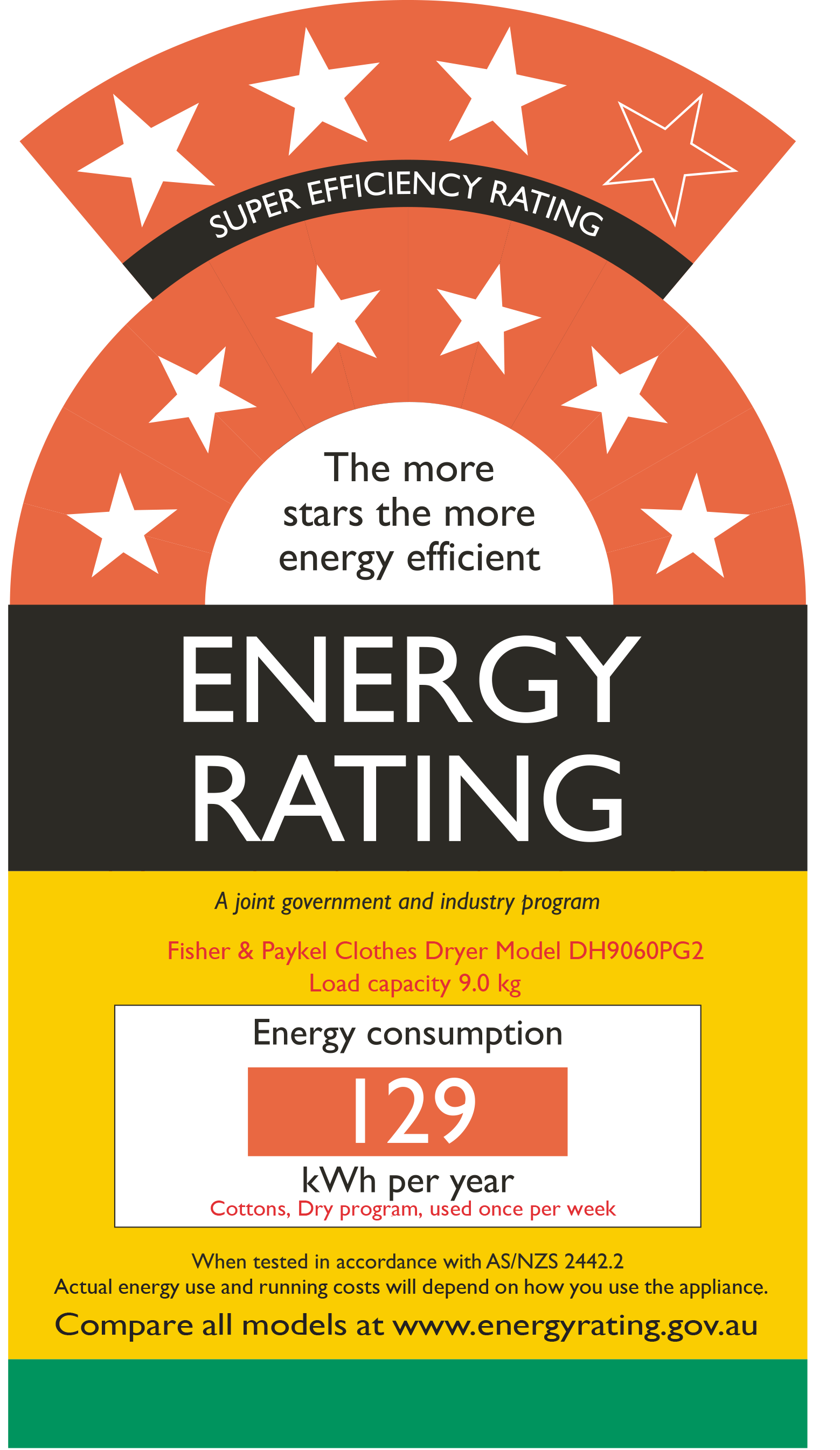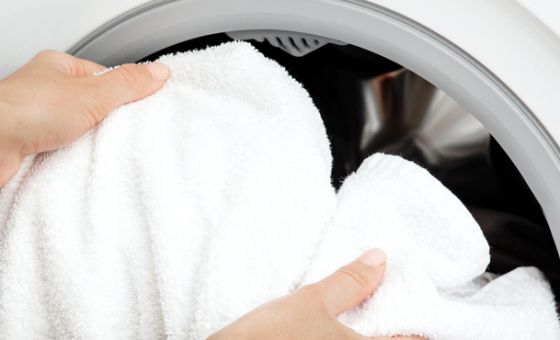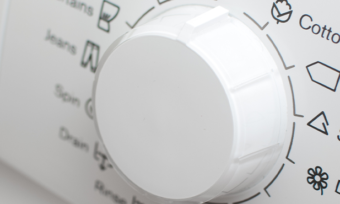Compare clothes dryers in New Zealand with Canstar Blue. LG, Samsung, Bosch, Fisher & Paykel and Haier were compared on Overall Satisfaction, Design, Ease of Use, Performance & Reliability, Quietness and Value for Money.
See our Ratings Methodology.

In laundries across the motu, LG is the No.1 choice of clothes dryer for Kiwi consumers.
Our review compares clothes dryers on customer satisfaction, so you can discover what other Kiwis think about our compared clothes dryer brands before you go ahead and make a purchase. Think of it like asking hundreds of your closest family, friends and colleagues which clothes dryers they think are best!
Canstar Blue surveyed 452 Kiwis who had bought a clothes dryer over the past five years for their feedback on the clothes dryer they bought.
Respondents rate their satisfaction with their clothes dryer brands from zero to ten, where zero is extremely dissatisfied and ten is extremely satisfied. Brand satisfaction was rated by respondents on the following criteria:
The winning brand is the one that receives the highest Overall Satisfaction rating once all the scores from the Overall Satisfaction criteria are combined and averaged.
Brands must have received at least 30 responses to be included, so not all brands available in the market have been compared in this survey. The brands rated in this survey are listed below in order of best overall satisfaction.
Find more information on our Most Satisfied Customer methodology.

This year’s Dryer Award winner, LG, tops our table with a near perfect set of 5-Star ratings. Not only is LG the only dryer brand to earn a 5-Star rating for Overall Satisfaction, its tally of five top ratings is more than the number achieved by the other brands on our awards table combined.
LG is a multinational electronics company that is based in South Korea. It produces a wide range of electronic goods and home appliances. In New Zealand, it retails six heat-pump dryers.
The range encompasses black and white dryers from 8kg to 10kg models. LG’s top-of-the-range dryers boast features that include:
![]()
Samsung sits second on our awards table, and its customers award the brand one top rating, for Performance & Reliability. Across all other categories, it achieves great 4-Star ratings.
Samsung’s range of heat-pump dryers comprises five models, four 9kg models and one 10kg model, in white and black colours. All models are super efficient, boasting either 9- or 10-star energy ratings. Other features include: nine-sensor AI dry, automatic door open and smart connectivity.
![]()
Bosch has an impressive track record in Canstar Blue’s appliance awards: it’s a two-time winner of our Dryer Award and a multiple winner of our Dishwasher Award.
Placing third on this year’s Dryer Award table, it again achieves a great set of scores from its many happy customers: two top 5-Star ratings, for Quietness and Value for Money, and 4-Star ratings across all other categories.
German appliance manufacturer Bosch is synonymous with quality and design, and many of its models are made in Germany. It has a range of five heat-pump dryers, across three Series: 4, 6 and 8. There are four 8kg dryers and one 9kg model.
All Bosch dryers feature auto-dry sensing, while more expensive models boast no-lint auto-cleaning and smart connectivity. Energy ratings vary between models, from 7 up to an impressive 10 stars, for the Series 8 8kg dryer.
![]()
Fisher & Paykel earns a clean sweep of great 4-Star ratings across the board, including for Overall Satisfaction, Value for Money and Performance & Reliability, which was the key attribute highlighted by the consumers in our research.
Fisher & Paykel is a brand synonymous with appliances in NZ, and it sells an impressive range of dryers:
Heat-pump dryers: 14 models: 8-10kg | 13-25 settings | 7- to 10-star energy ratings
Vented dryers: 3 models: 5-7kg | 4-10 settings | 2-star energy ratings
Condensing dryer: 1 model: 8kg | 13 settings | 2-star energy rating
More expensive models feature steam freshen, to quickly dewrinkle and deodorise your clothes, and smart connectivity.

Fisher & Paykel’s sister brand Haier rounds out our award table and earns 3-Star ratings across all our award categories. While not a stand-out result, a 3-Star rating isn’t a measure of dissatisfaction. Rather Haier’s tally of 3-Star ratings indicates that its consumers are still happy with their dishwasher purchases.
Haier was founded in China in 1984 and is the owner of Fisher & Paykel. Here in NZ, the brand is often considered a cheaper alternative to Fisher & Paykel products, delivering great design and features at an affordable price.
It sells a range of dryers similar to those offered by Fisher & Paykel:
Heat-pump dryers: 8 models: 8-10kg | 12-20 settings | 7- to 8-star energy ratings
Vented dryers: 3 models: 4-7kg | 7-15 settings | 2-star energy ratings
More expensive models feature steam freshen, to quickly dewrinkle and deodorise your clothes, and smart connectivity.
Not all clothes dryer brands in the market qualify for our ratings (based on minimum survey sample size), but that doesn’t mean they’re not worth considering. Here are more brands to check out before making a purchase decision.

AEG is a German company that produces a wide range of premium brand home appliances and electronic goods.
Its range comprises nine 8kg and 9kg heat-pump dryers that have high-tech features, such as 3DScan technology, to ensure that clothes are dried with precision and care, and wi-fi connectivity.

Beko is a Turkish company that is one of Europe’s biggest appliance manufacturers. Here it sells a range of seven models covering heat-pump dryers, condenser dryers and regular dryers.
All machines are backed by 5-year warranties and models range from an inexpensive 2-star energy rated 7kg vented dryer up to a 9-star energy rated 10kg hybrid heat-pump model that has steam functions and wi-fi connectivity.
Electrolux is a Swedish appliance company. It’s a premium brand that sells a range of 12 dryers: eight heat-pump dryers and four vented dryers. Load weights range from 6kg-9kg and energy ratings between 2 and 9 stars. More expensive models feature steam and 3D SensiCare settings and wi-fi connectivity.

The Warehouse’s own brand Living & Co is known for its no-frills products and low prices. Through the Warehouse’s big red barns, Living & Co retails one 2-star energy rated, 7kg vented dryer.

Miele is a German premium brand that manufactures a wide range of home appliances. Its range of dryers comprises eight heat-pump models. Its cheapest 7kg model has a 9-star energy rating and features Miele’s exclusive FragranceDos system for fragrant laundry.
The most expensive dryer in Miele’s range is its 9kg Passion dryer, which has a 10-star energy rating and drying programs to match clothing from outdoor wear to denim.
Japanese manufacturer Panasonic is best known for its electronic goods, such as TVs and audio products. But it also produces a range of kitchen and laundry appliances.
In addition to its washing machines and washer-dryers, it makes four dedicated dryers: vented models with 7kg and 8kg capacities, and two heat-pump models, 9kg and 10kg.
 Westinghouse
WestinghouseWestinghouse is part of the Electrolux group, but as a brand has been producing quality appliances in Australia since the 1930s. Its range of dryers incorporates three vented dryers in 4.5kg, 5.5kg and 6.5kg models, more expensive dryers in this range feature SenseDry technology, which allows you to pick your level of dryness: extra dry, cupboard dry and iron dry.
Westinghouse’s five heat-pump models includes 8kg and 9kg dryers that have SenseDry, a delicates setting, auto cool-down for fewer wrinkles, and 7- and 8-star energy ratings.
When choosing a clothes dryer, energy efficiency is a big consideration for many consumers. Indeed, 38% of respondents in our survey say that their choice of dryer was heavily influenced by its energy-saving rating: heat-pump models score between 8 and 10 stars for energy efficiency, while conventional, cheaper models only around 2 stars.
However, when it comes satisfaction with their choice of dryer, what influences consumers the most?
Despite the various settings offered by more expensive models, clothes dryers pretty much all perform the same task and should produce the same outcome: dry clothes. So it’s unsurprising that Performance & Reliability is the biggest consideration for the consumers in our survey. And Ease of Use is also an important factor, cited by 30% of respondents.
And it’s interesting to note that Value for Money is less of concern, which indicates that the consumers in our survey are generally happy with the price points of the dryers they’ve purchased.
Here’s the full rundown of what the clothes dryer consumers in our survey say are the main things they consider when rating their purchases.

If you’re in the market for a new clothes dryer, apart from the best appliance brand, what do you need to consider before making your purchase. Canstar Blue walks you through what to consider when buying a new clothes dryer.
The first step when buying a clothes dryer is working out the size you need. Do you have a large family, and how much clothing do you need to dry on a regular basis? Most dryers have a capacity of between 4-10kg, however, if you’ve got no clue about your needs, consider these two tips:
Also, consider the following:
Once you’ve settled on the size of dryer you require, you need to consider the type of machine you want to buy:
Vented dryers are the simplest form of dryer. They heat air, pass it into the drum, and then vent it, often outside via a hose. Vented dryer capacity ranges from 3kg to 9kg. Prices start from as little as $500.
Pros:
Cons:
Condenser clothes dryers recycle hot air by extracting the water vapour from it. The dry air is then sent back through the clothes in the dryer, while the water is either collected in a tank or expelled into the drain via a hose.
While this method of dealing with moist air means no humidity in your laundry room, it doesn’t do anything for the heat itself, meaning your laundry will be just as warm as if you were using a vented dryer.
Condenser clothes dryers cost from around $650 upwards.
Pros:
Cons:
A heat-pump dryer is a type of condenser dryer, which recycles heat in the process of extracting moisture. This means you get great drying results while consuming up to 50% less electricity than other dryer types. Prices start from around $1000.
Pros:
Cons:

When choosing a dryer, energy efficiency is an important consideration, one that can save you a considerable amount of money over the lifetime of your appliance.
As we mention above, a third of respondents in our survey say that their choice of dryer was heavily influenced by its energy-saving rating.
Finding an energy-efficient dryer is simple. Just check its Energy Rating Label (see right). The more stars, the more energy-efficient the dryer.
The label also shows an estimated kWh usage per year, which if you know how much you’re paying for power, can help you work out the dollar cost of using the dryer.
Keep in mind that cheap and basic appliances tend to be less energy-efficient. So to lower your running costs, you’ll likely have to raise your upfront costs. However, as a dryer is one of the costlier appliances to run, choosing an energy-efficient model is a wise investment.
There is a big difference in the amount of electricity dryers use. A 2-star model can burn through close to 7kWh per load, while a 10-star model uses around 2kWh.
This means there’s a big difference in their running costs. The following calculations show running costs according to current government energy ratings, which assume one cotton load per week.
To do the calculations below we’ve used the national average power price of 35.67c p/kWh.
| Energy star rating | Machine Load | Per Year Energy Use | $ Per Year | $ Per Load |
| 10 Stars | 9kg | 105kWh | $37.45 | $0.72 |
| 9 Stars | 9kg | 129kWh | $46.01 | $0.891 |
| 8 Stars | 9kg | 145kWh | $51.72 | $0.99 |
| 7 Stars | 8kg | 159kWh | $56.72 | $1.09 |
| 2 Stars | 8kg | 355kWh | $126.63 | $2.44 |
As you can see, if you buy a cheap 2-Star energy rated dryer, instead of a more efficient one, you’ll be paying a lot more to use it, especially if you’re running it more than once per week.
Over 10 years on the above numbers, a 2-star 8kg dryer will cost $892 more to run than a larger 9kg 10-star dryer.

Always read and abide by your garment’s care label. And if an item is particularly precious or expensive, maybe just use a clothes horse. However, here’s a guide to which fabrics are safe to use in a dryer.
Usually safe, but should be done on a low heat, as if it’s too high the clothes can permanently wrinkle.
100% cotton clothes may shrink if put in a dryer, although most cotton blends should be able to survive the drying cycle shrink-free. But always use a low heat, and it pays to check a garment’s label to see if it has been pre-shrunk.
Denim fabrics can be put into a dryer. But for optimal care, take them out just before the end of the cycle and leave them finish air drying, as they’ll keep their shape for longer. Use a low-heat and delicate cycle if using a tumble dryer, as well as low heat if you have crinkles to iron out.
Most linen options, such as towels and sheets, are dryer safe. Although tumble drying may impact the lifespan of the linen. Use a low temperature, and be mindful that linen can be prone to wrinkling.
Linen clothing, however, is a different story. Many garment manufacturers recommend linen clothing to be professionally dry cleaned or air-dried, to avoid shrinkage and creasing.
Microfibre-made clothes and covers should be fine, as long as the dryer is set to a low temperature, as microfibre dries quickly in comparison to other materials. It’s also recommended to dry with other microfibre products to prevent lint from building up.
Most nylon clothes should be dryer safe. But, as nylon dries quickly, it’s recommended that nylon is put through a low-temperature cycle. Also grab the clothes out of the machine as soon as possible, as they can be damaged if left in the dryer too long. Nylon also builds up static cling, so be sure to dry with a dryer sheet to avoid getting zapped.
Polyester is quick-drying, so you may not even need to use a clothes dryer. But, for peace of mind, you won’t ruin your clothes if you do use a machine. Using a low-temperature cycle will also avoid any possible damage or shrinkage. Again, beware the static!
As spandex is often mixed with other fabrics, you’ll have to check your clothes’ tags before you throw them in the dryer, as some spandex clothing may be fine to dry, while others are best hung out to dry. Generally, the more spandex your clothes contain, the more possible dryer damage.
 About the editor of this page
About the editor of this pageBruce Pitchers is Canstar NZ’s Content Manager. An experienced finance reporter, he has three decades’ experience as a journalist and has worked for major media companies in Australia, the UK and NZ, including ACP, Are Media, Bauer Media Group, Fairfax, Pacific Magazines, News Corp and TVNZ. As a freelancer, he has worked for The Australian Financial Review, the NZ Financial Markets Authority and major banks and investment companies on both sides of the Tasman.
In his role at Canstar, he has been a regular commentator in the NZ media, including on the Driven, Stuff and One Roof websites, the NZ Herald, Radio NZ, and Newstalk ZB.
Away from Canstar, Bruce creates puzzles for magazines and newspapers, including Woman’s Day and New Idea. He is also the co-author of the murder-mystery book 5 Minute Murder.
Only use dryer when not possible to dry outside: 56%
Energy-saving rating played big part in choice of dryer: 38%
Use dryer for all clothes drying: 28%
Own a heat-pump dryer: 21%
Have a combined washer/dryer: 12%
Canstar Blue surveyed 2501 New Zealand consumers across a range of categories to measure and track customer satisfaction, via ISO 26362 accredited research panels managed by PureProfile. The outcomes reported are the results from customers who had purchased a clothes dryer in the past five years. In this case, 452 New Zealanders. Brands must have received at least 30 responses to be included. Results are comparative and it should be noted that brands receiving three stars have still achieved a satisfaction measure of at least six out of 10. Not all brands available in the market have been compared in this survey. The ratings table is first sorted by star ratings and then by mean overall satisfaction. A rated brand may receive a ‘N/A’ (Not Applicable) rating if it does not receive the minimum number of responses for that criterion.
The past winners from Canstar Blue’s Clothes Dryers ratings:

Appliances - June 23rd
KEY POINT
According to 452 New Zealand tumble dryer buyers who took part in Canstar’s 2025 Dryer Award survey, LG is the best dryer brand in New Zealand for delivering consumer satisfaction.
If you’re in the …
– Read more
Appliances - March 28th
Why do I need to clean my water bottle/travel mug?
Cleaning your water bottle or travel mug regularly is essential for several reasons:
Hygiene: bacteria, mould, and other microorganisms can accumulate in your water bottle or …
– Read more
Best-Rated Clothes Dryers - March 26th
What is a top fridge-freezer?
A top fridge-freezer refers to a type of refrigerator-freezer unit where the freezer compartment is located at the top of the appliance, above the refrigerator compartment. In this design, the freezer …

Appliances - March 18th
Why do delicates need to be washed differently?
Delicate items, like silk blouses or lace lingerie, need special care when washing because they’re made of fragile fabrics or have intricate details. Regular washing machines and harsh …

Appliances - February 20th
Kitchen appliances
Air fryers
3.75L Air Fryer ($85)
If it’s your first time buying an air fryer, or you’re not willing to break the bank, consider Kmart’s affordable 3.75L air fryer. Prepare delicious, crispy fries, nuggets and more …